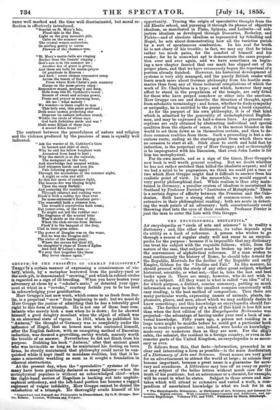GRUPPY ON THE PROSPATS OF GERMAN PHILOSOPHY. * THRISEig a certain
manner of expressing a consciousness of vie- toe/ 'which, by a metaphor borrowed from the poultry-yard or the cook-pit, is denominated " crowing," and which in refined circles is regarded as a sign of ill-breeding. When you have beaten your adversary at chess by a "scholar's mate," or detected your oppo- nent at whist in a "revoke," courtesy forbids you to be too loud in acknowledging your gratification. Herr Gruppe's last new work, which comes to us fresh from Ber- lin, is a perpetual "crow " from beginning to end; but we must do Herr Gruppe the justice of admitting that he has a tolerably good right to this form of triumph. He is not one of those base com- batants who merely kick a man when he is down ; for he showed himself a good doughty assailant when the object of attack was in an abnormal state of vigour. In 1831, when he published his "Antleus," the thought of Germany was so completely under the influence of Hegel, that an honest man who contented himself, after the English fashion, with an unaspiring method of Baconian induction, was deemed a grovelling, earthy wretch, scarcely worth the trouble of an answer. Nevertheless he did not flinch from his purpose. Dubbing his book "Animus," after that ancient giant who was invincible so long as he maintained his footing on terra firma, he stoutly maintained that philosophy could never be van- quished while it kept itself to mundane realities, but that it be- Game a miserable weakling as soon as it sought a foundation in ethereal abstractions.
At the present day, when the " speculative " systems of Ger- Many have been practically declared so many failures—when the metaphysical populace is without an acknowledged chief—when thP3 right-hand section of Hagelism is backing out into unphilo- sephioal orthodoxy, and the left-hand portion has become a ragged regiment of vulgar infidelity, Herr Gruppe cannot be denied the satisfaction of a triumph. He thoroughly avails himself of his
• Gegenwart and Zukenft der Fhilosophie in Deatschland. By O.P. Gruppe. Bee- liu, Reimer. London, Williams and Norgate.
opportunity. Tracing the origin of speculative thought from the old Eleatic school, and pursuing it through its phases of objective idealism, as manifested in Plato, Spinoza, and Leibnitz—of sub- jective idealism as developed through Descartes, Berkeley, and Fichte—and of absolute idealism as represented by Schelling and Hegel, he sets about demonstrating how all the varieties perish by a sort of spontaneous combustion. In his zeal for truth. he is not chary of his trouble ; in fact, we may say that he takes rather too much pains, for the comfort of himself and his reader; for he is somewhat apt to demonstrate the same proposi- tion over and over again, and we have sometimes on begin.- ing a new chapter fancied that our mark has slipped out of its. proper place, and that we have erroneously begun the reperusal of a portion already finished. However, his historical development of systems is very ably managed, and the purely British reader will learn much more about German philosophy from his hostile sum- maries than from any of those technical compilations of which the work of Dr. Chalybxus is a type; and which, however they may affect to stand in the propylaeum of the temple, are only fitted for those who have peeped somehow or other into the sanctum. Herr Gruppe can see and describe the direction of thought, apart. from scholastic terminology; and hence, whether he finds sympathy or antipathy, he is entitled to the praise of being a lucid expositor.
As for the purport of his own philosophy, it is of that kind which is admitted by the generality of unmetaphysical English- men, and may be expressed in half-a-dozen lines. As general con- ceptions are only obtained by abstracting individual and special- qualities from the objects of sense, it is the merest blunder in the world to set them down as in themselves certain, and then to de- duce common realities from them. Such a proceeding is but a cir- cuitous route, ending at the starting-point from which there was no occasion to start at all. Stick close to earth and hold fast by induction, is the perpetual cry of Herr Gruppe ; and so thoroughly is he impregnated with his Baconiam, that even John Locke is for him too metaphysical.
For its own merits, and as a sign of the times, Herr Gruppe'a new book is well worth general reading. But we doubt whether he has not rather scotched than killed the idealistic serpent; and if we had a mind to be pugnacious, we think we could put a case or two which Herr Gruppe might find it difficult to answer from his realistic point of view. In the meanwhile, we would suggest a very pretty philosophical duel. While realism is thus ably main- tained in Germany, a peculiar system of idealism-is maintained in Scotland by Professor Ferrier's " Institutes of Metaphysic." There is a certain degree of affinity between the Prussian and the Cale-
donian. Both have a strong stock of common-sense; both are extensive in their philosophical reading; both are acute in detect- ing the weak points of an adversary ; both conscientiously avoid throwing dust into the eyes of their readers. Professor Ferrier is just the man to enter the lists with Otto Gruppe.


























 Previous page
Previous page